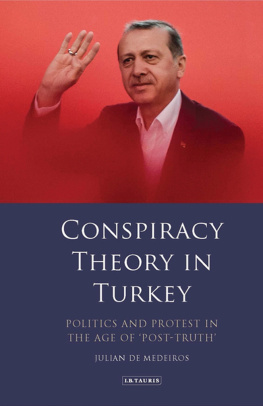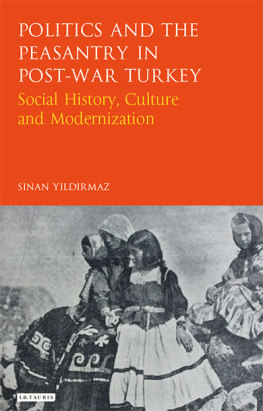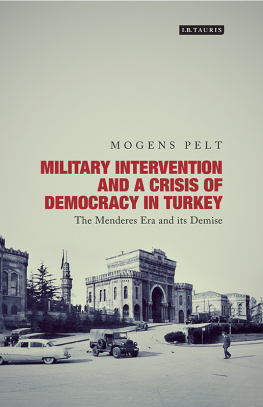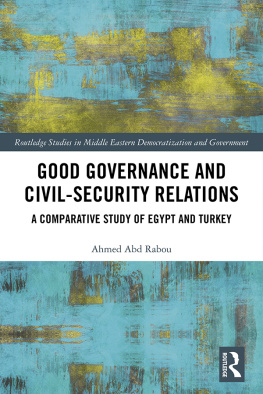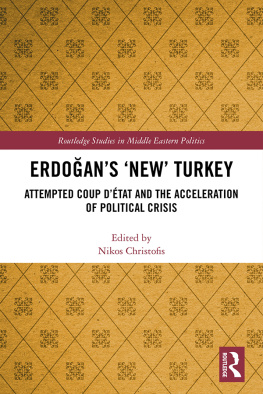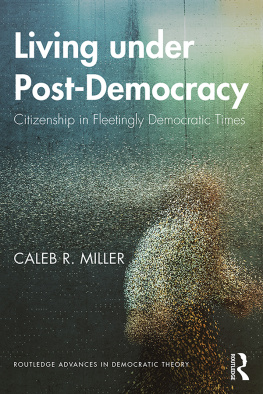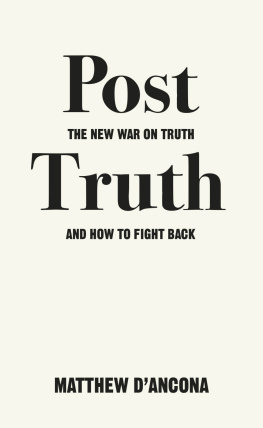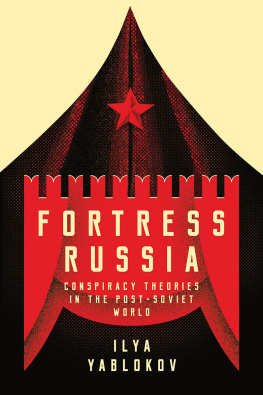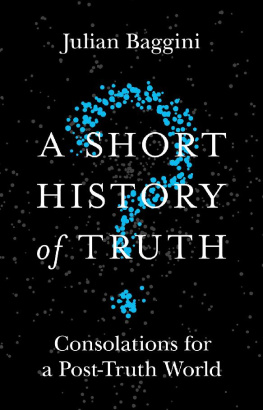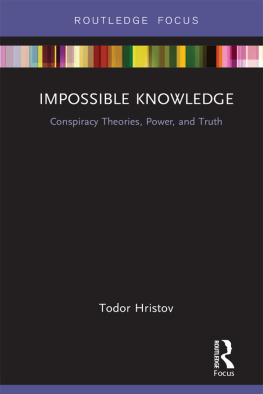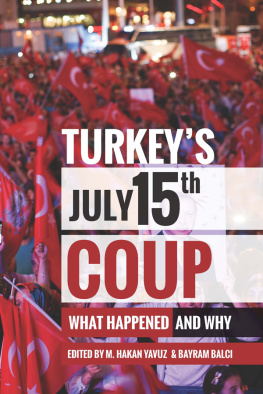I am exceedingly grateful for the support of my two excellent supervisors, Prof Neophytos Loizides and Dr Iain Mackenzie. I would also like to thank the University of Kent for providing me with a Kent 50th scholarship, without which the completion of my dissertation, and subsequent book would have been impossible. In addition, I am grateful to have tested some of the ideas contained in the book by writing short articles for Rosemary Bechler at OpenDemocracy and Harriet Fildes at Independent Turkey. Their careful edits and suggestions helped shape subsequent drafts of the text.
I am eternally grateful to Lester Crook of I.B.Tauris, for believing in the merit of my ideas and the development of my writing. With his guidance and mentorship I was able to experience for the first time the thrill of working on a genuine book project. I would also like to thank Sophie Campbell, Joanna Godfrey and Ken Moxham for their insightful comments, editorial assistance and patience throughout the entire process.
Finally, I would like to thank my family, my wife and my friends for their continued love and support as I personally tested one of Goethes great maxims: Bonus vir semper tiro.
Conspiracy theories in Turkey abound. Ranging from the historical to the ideological, from the religious to the mundane, politics in modern Turkey is undeniably inundated with accusations of conspiracy. The polarization and social tensions that have marked the last few years have led to an increase in conspiratorial rhetoric. Amidst the ongoing purge of both real and imagined adversaries, the Turkish political elite readily employ accusations of conspiracy as an interpretative and framing lens for all manner of opposition to and defence of the ruling party. As a result, conspiracy theories have become a mainstay of Turkish political rhetoric, and are used to justify the implementation of increasingly harsh repression, and indeed persecution, of any form of political opposition.
In addition, the intensity of the Turkish state response to the 2013 Gezi protests and the 2016 coup attempt has radically challenged the international consensus on Turkish politics. The optimism with which commentators once greeted the so-called Turkish model as proof of the compatibility of secular democracy and religious conservatism has ceded to pessimism regarding the future of Turkish democracy and concern regarding the increasingly authoritarian measures employed to curb opposition, freedom of speech and civil liberties.
Defiant in the face of unprecedented popular challenges, President Recep Tayyip Erdoan has emerged as a populist and innovative, yet equally polarizing and enigmatic, political leader. Under his leadership, political crackdowns and nationwide purges of public institutions, higher education and the civil service have sown confusion surrounding legitimate versus illegitimate resistance to the status quo. Commentators express growing concern for the vitality of Turkish democracy, pointing towards a deteriorating record on civil liberties and human rights, increasingly authoritarian leadership and unstable prospects for continued economic growth.
Many attribute these issues specifically to Erdoans distinctive leadership style. Both friend of the people and pursuer of perceived enemies, his distinctive political persona is one that cultivates opponents and allies both real and imagined. As such, there exists an understandable propensity in the academic literature towards focusing on Erdoan as the chief culprit of Turkeys political turmoil. While Erdoan is indeed central to the popularization and successful exploitation of paranoid politics in Turkey today, this book argues instead that conspiratorial rhetoric and political framing of narratives of conspiracy warrant a much more systemic, and indeed holistic, analysis of what is essentially a system of contentions and contradictions appertaining to the idea of the friend/enemy in Turkish democracy.
The book makes the case that the experience of Turkish democracy in its current guise cannot, and should not, be boiled down to the theatrics of one antagonistic leader, no matter how contentious. Instead, the book suggests a critical reading of the impact and forces brought to bear through, in reference to and deriving from conspiracy theory. Or, to be precise, the book juxtaposes the academic literature theory on conspiracy theory with the political impact of conspiracy theory in contemporary Turkish politics as evidenced by the post-Gezi and post-coup elite framing strategies.
That is to say, Conspiracy Theory in Turkey seeks to examine the extent to which such theories can be seen as symptomatic, and indeed strategic, of the Turkish state response to opposition and the consolidation of increasing powers both democratic and autocratic in nature. The book provides an urgent yet balanced account of the escalating tensions in Erdoans New Turkey by focusing on paranoid politicians, conspiracy theories, inside agitators and accused coup-plotters, activists, academics and journalists. The goal is to explore the relative merits, or lack thereof, of the discussion of post-truth in its Turkish iteration, and to contrast both the resistance and pro-government interpretations of the post-Gezi and post-Coup Turkish political experiment within a critical discussion of the role of conspiracy theory in Turkish politics.
In Turkey, where it has become difficult to distinguish fact from fiction, allies from enemies and democracy from autocracy, the rise of conspiracy theory in Turkish political rhetoric is readily apparent. But the question remains, how can one make sense of it all? And can such tensions be reconciled within the consensual spirit required for the functioning of liberal democracy? This book argues that we cannot square the circle of conspiracy theory in Turkey unless we recognize the way in which such narratives build upon pre-existing socio-political divides, prejudices and suspicions, and indeed derive very real force precisely from those accusations that are not necessarily based in reality.
In other words, to understand whether or not Turkish democracy can evade the clutches of a paranoid politics and what has popularly come to be known as a post-truth politics, we must first question the ideas, fears, hopes and dreams with which such a politics is either sustained or combated. In this book I set out to provide a critical and inquisitive framework of the processes of conspiracy theory in Turkey today, so as to lay the groundwork for a better understanding of the impact of real versus non-real political narratives, and, in turn, to provide those seeking to understand, negotiate and facilitate Turkeys integration within the wider international community with a toolkit of sorts by which to make better sense of Turkeys oftentimes fantastical political rhetoric.
Conspiracy theory, and accusations of conspiracy have emerged as one of the primary justifications for an increasingly repressive and antagonistic politics in Turkey. The challenge is, then, how to take the idea of conspiracy theory seriously, not by engaging in the practice of de-bunking, or fact-checking, but instead by understanding the mechanisms, contradictions and processes that fuel the logic and reason, or lack thereof, underlying such a paranoid politics.

